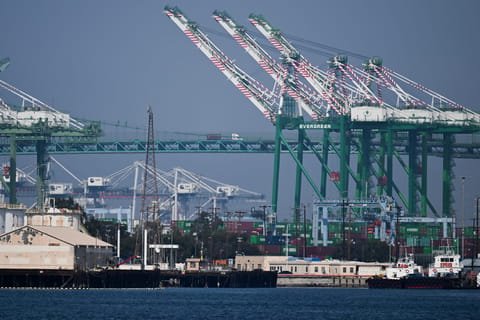Trump calls the EU an “atrocity” for running a huge trade surplus with the U.S., but that largely overlooks America’s massive services sector.

It’s happening: Donald Trump has launched his global trade war — and has Europe in his sights.
After slapping tariffs of 10 percent on China, the United States president called the European Union an “atrocity” on trade and said he’d “definitely” impose duties on imports from the bloc.
Trump’s threats have sent Europeans scrambling for a response. While the European Commission vowed “firm” retaliation, some European leaders have tried to strike a conciliatory tone, with German Chancellor Olaf Scholz offering an “outreached hand” to solve outstanding disputes.
The impending trade war is a major headache for the EU: The bloc is a major exporter to the U.S., and tariffs would deal a significant blow to European companies and consumers.
But while it’s a truism of trade spats that everyone loses something, some sectors — and countries — stand to lose more than others. We crunched the numbers to find out who is most at risk:
How much do the EU and US trade?
The U.S. is the EU’s top commercial partner, with total trade in goods and services exceeding €1.5 trillion in 2023.
Trump has repeatedly taken aim at the EU’s allegedly “unfair” trade practices, blaming them for America’s large deficit with the bloc, which amounted to some €157 billion in 2023. However, when services are taken into account, this deficit is offset substantially. The U.S. enjoyed a €109 billion surplus in services with the EU, thanks mainly to professional and management services, intellectual property and financial services.
What does the EU sell — and what does it buy?
Should Trump slap blanket tariffs on all imports from the EU, car and machinery manufacturers and pharma companies would be the most affected.
The EU exported more than €90 billion worth of vehicles to the U.S. in 2023 — a sore point for Trump, who lamented that EU countries “send cars to us by the millions” but “won’t take our foreign products, and they don’t take our cars.”
That claim is not entirely correct. The EU bought nearly €14 billion-worth of U.S. vehicles in 2023 — which is admittedly far fewer than it sold.
If the Commission were to deliver on its promise to retaliate against U.S. levies, it would find itself in a pickle.
As part of its plan to phase out Russian energy imports, the EU has increasingly relied on the U.S., which is now the bloc’s second-largest gas partner and largest supplier of liquefied natural gas. The Commission would have to choose between hitting the U.S. where it hurts and preserving the bloc’s energy supply.
Who exports most to the US?
Some countries would suffer the impact of a trade war more than others. Germany, Italy and Ireland alone accounted for more than 50 percent of exports to the U.S. in 2023.
Tariffs on cars — which were narrowly avoided during Trump’s first term — would deal a potentially fatal blow to European (and specifically German) automakers, who are already dealing with lower sales and concerns over a possible flood of Chinese cars into the EU.
What’s more, many of these companies have operations in Mexico — another target of Trump’s trade wrath. Should those tariffs take effect, they would face the expensive prospect of shifting production to the U.S.
What can the EU do?
The EU’s options are limited and unappealing.
EU countries could opt for a truce, offering to buy more U.S. liquefied natural gas and boosting their defense spending, or get tougher on China — which would potentially trigger another trade war with the bloc’s second-largest partner.
Alternatively, the EU could retaliate by imposing its own tariffs, like it did during Trump’s first term. But studies have shown it might end up hurting itself in the process.
Whatever happens next, Trump is dead set on waging a war he believes he can win — and Europe doesn’t seem adequately prepared to stop it.




